

Quantum Calculations Can Make Atomic Clocks of the Future Far More Accurate. Sharing Information Corrupts Wisdom of Crowds. When people can learn what others think, the wisdom of crowds may veer towards ignorance.
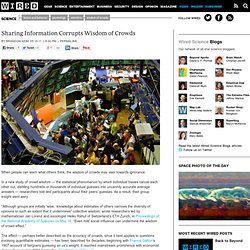
In a new study of crowd wisdom — the statistical phenomenon by which individual biases cancel each other out, distilling hundreds or thousands of individual guesses into uncannily accurate average answers — researchers told test participants about their peers’ guesses. As a result, their group insight went awry. Climatology-Defying Paper Yanked for Plagiarism. By John Timmer, Ars Technica The so-called “hockey stick” plot of recent climate, in which recent temperatures appear as a sudden and anomalous rise after a thousand years of relative stability, has become a bit of an icon for climate change.
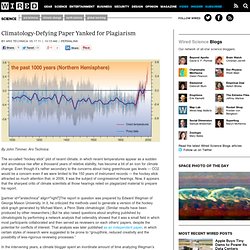
Even though it’s rather secondary to the concerns about rising greenhouse gas levels — CO2 would be a concern even if we were limited to the 150 years of instrument records — the hockey stick attracted so much attention that, in 2006, it was the subject of congressional hearings. Now, it appears that the sharpest critic of climate scientists at those hearings relied on plagiarized material to prepare his report. [partner id="arstechnica" align="right"]The report in question was prepared by Edward Wegman of George Mason University.
Scientists Fight University of California to Study Rare Ancient Skeletons. SAN DIEGO — Two ancient skeletons uncovered in 1976 on a bluff overlooking the Pacific Ocean, during construction at the home of a University of California chancellor, may be among the most valuable for genetic analysis in the continental United States.
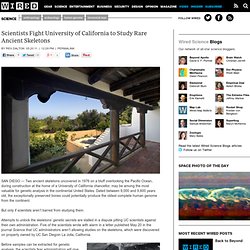
Dated between 9,000 and 9,600 years old, the exceptionally preserved bones could potentially produce the oldest complete human genome from the continent. But only if scientists aren’t barred from studying them. Attempts to unlock the skeletons’ genetic secrets are stalled in a dispute pitting UC scientists against their own administration. Five of the scientists wrote with alarm in a letter published May 20 in the journal Science that UC administrators aren’t allowing studies on the skeletons, which were discovered on property owned by UC San Diegoin La Jolla, California. “This is Kennewick Man II,” White said, referring to the long federal court battle in 2004 when scientists won the right to study bones found in Washington. Geometric Principles Appear Universal in Our Minds. In a South American jungle, far from traffic circles, city squares and the Pentagon, beats the heart of geometry.

Villagers belonging to an Amazonian group called the Mundurucú intuitively grasp abstract geometric principles despite having no formal math education, say psychologist Véronique Izard, of Université Paris Descartes, and her colleagues. [partner id="sciencenews" align="right"]Mundurucú adults and 7- to 13-year-olds demonstrate as firm an understanding of the properties of points, lines and surfaces as adults and school-age children in the United States and France, Izard’s team reports online May 23 in Proceedings of the National Academy of Sciences. U.S. children between ages 5 and 7 partially understand geometric space, but not to the same extent as older children and adults, the researchers find.
These results suggest two possible routes to geometric knowledge. Top 10 New Species Discovered in 2010. Madagascar: Andasibe-Mantadia National Park, Mantadia Reserve.
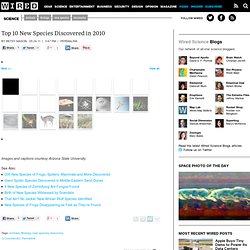
Caerostris female (MTCA05F), web 41x46x19. 24.iv.2008. Photo M. Electrons Are Near-Perfect Spheres. By Duncan Geere, Wired UK A 10-year study has revealed that the electron is very spherical indeed.

The Man Who Swims With Coelacanths. More than seven decades later, the words have the same urgency as when they rolled off Marjorie Courtenay-Latimer’s telegraph machine and into history: Courtenay-Latimer was the young curator of a natural history museum on South Africa’s east coast.
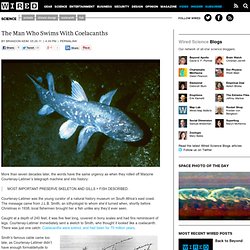
The message came from J.L.B. Smith, an icthyologist to whom she’d turned when, shortly before Christmas in 1938, local fishermen brought her a fish unlike any they’d ever seen. Disbelieving Free Will Makes Brain Less Free. If people are told that free will doesn’t exist, their brains might follow suit.

A test of people who read passages discrediting the notion of free will found an immediate decrease in brain activity related to voluntary action. The findings are just one data point in ongoing scientific investigation of a millennia-old philosophical conundrum, but they raise an intriguing possibility. “Our results indicate that beliefs about free will can change brain processes related to a very basic motor level,” wrote researchers led by psychologist Davide Rigoni of Italy’s University of Padova in a study published in May’s Psychological Science. ‘Abstract belief systems might have a much more fundamental effect than previously thought.’ Rigoni’s team asked 30 people to read passages from Francis Crick’s 1994 book The Astonishing Hypothesis: The Scientific Search for the Soul. The test subjects were then asked to press a mouse button when a cursor flashed on a computer screen for several seconds.
Desktop Big Bang Shows Time Travel May Be Possible After All. The first desktop model of the Big Bang reportedly showed why time travel doesn’t work.

Two Ultraheavy Elements Added to Periodic Table. By Mark Brown, Wired UK.

New Fossils Push Homo Erectus Origins Back to Asia. By John Timmer, Ars Technica The story of the evolution of modern humans can be a bit confusing, species-wise, with many early hominins co-existing without an obvious linear succession. But, geographically, all the action has appeared to take place in Africa, at least until the appearance of Homo erectus, which left Africa and spread globally, only to be replaced by later species of African origin: us. Over the past year or so, however, our history has become a bit more complicated, with evidence that our ancestors interbred with earlier human relatives that had already dispersed throughout Asia.
Plant Origami Shows How Dead Things Can Move. Many Exo-Earths May Have Exo-Moons. As many as one in four Earthlike extrasolar planets should have a moon-like moon, new supercomputer simulations show. Having a massive moon may be needed for complex life to evolve on a wildly tilting planet. Earth’s moon raised ocean tides and stabilized our planet’s chaotic spin, allowing life’s baby steps to occur in relative peace. “Without a large moon, our Earth would spin around randomly,” said astronomer Ben Moore of the University of Zurich in Switzerland, coauthor of a paper to appear in the journal Icarus. “Maybe it’s unlikely that a planet would have a massive moon, and that makes the Earth sort of special.” At one-quarter of Earth’s diameter and more than 1 percent of its mass, Earth’s moon is proportionately one of the largest satellites in the solar system. Wired Science. Giant Ground Sloth For Sale, $450K OBO.
Ancient Fossils Have Evolution’s First Shells. Nanomagnetic Computers Are the Ultimate in Efficiency. Computers that run on chips made from tiny magnets may be as energy-efficient as physics permits. The Mismeasures of Stephen Jay Gould. Video: Year of Moon Motion in 2.5 Minutes. How to Have Fun Like Monkeys, Whales and Foxes. Photos of Total Lunar Eclipse From Around the World. The Earth passed between the moon and the sun yesterday, giving people a brilliant, rusty-orange lunar light show from the ground and the web.
The 100-minute total lunar eclipse on June 16 was the longest in more than a decade. Time-Traveling Male Sea Monkeys Make Bad Mates. Humans Could Have Geomagnetic Sight. The Weird and Beautiful World of Fluid Dynamics. City Life Could Change Your Brain for the Worse. Life on Earth Arose Just Once. Foucault’s Pendulum Dented in Museum Mishap. The Tragic Race to Be First to the South Pole. The Crystals at the Center of the Earth. Early Birds’ Wings Probably Didn’t Flap. Congress Opens Investigation Into Genetic Testing Companies. China Could Wipe Out Recycled Toilet Paper. Networked Networks Are Prone to Epic Failure. Photos Surface of the Day Einstein Died.
Lousy DNA Reveals When People First Wore Clothes. Could a Mini Horse Be Bred Small Enough to Fit in Your Palm? New Giant Lizard Discovered in the Philippines. DNA Testing Finds Endangered Whale Meat in Restaurants. Lost Tribes Used Clever Tricks to Turn Amazon Wasteland to Farms. North American Dinosaurs Were One Big Happy Family. See Better by Believing You Can. New Evidence of Ice Age Comet Found in Ice Cores. Skydiver Aims to Jump From 120,000 Feet, Break the Sound Barrier.
Complex Life Traced to Ancient Gene Parasites. Climate Hackers Want to Write Their Own Rules. Fossil Antelope Teeth Hold Clues to Europe’s Missing Apes. Russian Physicists Synthesize New Superheavy Element 117. Evolution’s New Foe: Timid School Administrators. 95-Million-Year-Old Bugs Found in African Amber Surprise Scienti. Fossil Turtle Had Extra-Thick Shell to Fend Off World’s Largest.
EPA Scientist Says East Coast Beaches Threatened by Sea Level, B. Q&A: Geoengineering Is ‘A Bad Idea Whose Time Has Come’ Possible New Human Ancestor Discovered. Video: Chimpanzees Mourn Their Dead. Origin of Life Chicken-and-Egg Problem Solved. First Animals Found That Live Without Oxygen.